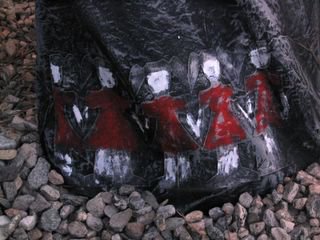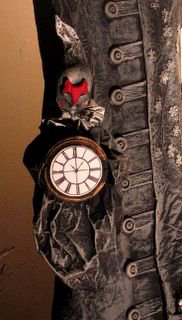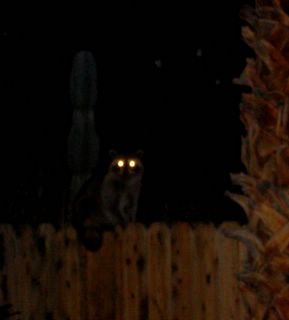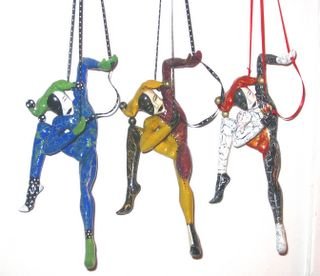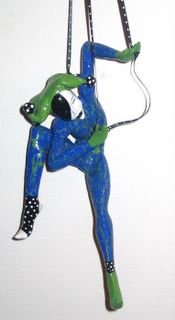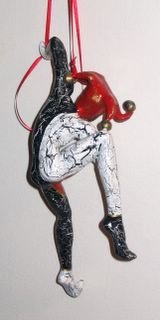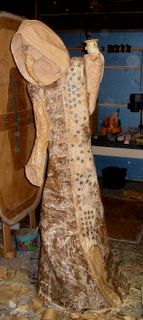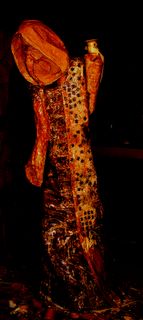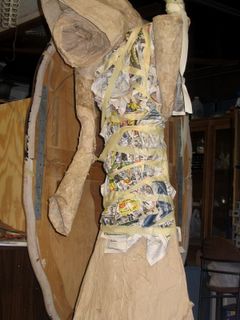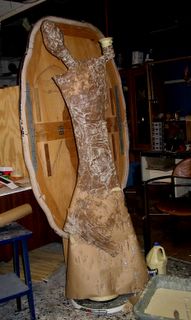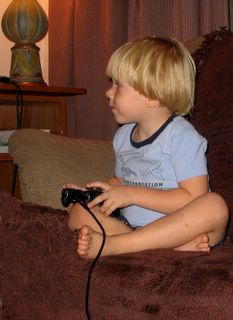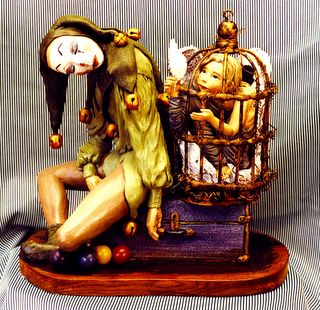“I’ve played this game before, with you. The board was bigger then. No. I was smaller.”
“Yessss.”
“I left this dream, and you came with me. And…my mother…”
“Brought…us…BACK!!” he roared the words. My hair blew back in the gust as he stood, violently striking the chessboard. The pieces flew, tiny missiles into the darkness. The board crashed into the shelves, shattering glass jars filled with horrors and sending shards flying in all directions. One tore into my cheek.
The noise was deafening. The wind was a discordant symphony of shrieks. A palm tree had just crashed onto an iron bench on the balcony, knocking it through the French door. Loosed curtains whipped in the violent, sandy air, creating strobe-like shadows. Fragments of glass littered the carpet. I was shaking, my fingers curled like two dying spiders. I pulled myself up and reached for the lamp. My hand brushed something soft…the cat? No, it was the puppet. I flung it to the floor.
Panicked, I was tangled in the covers, stumbling, half falling down the hall slapping at light switches as I went. To the kitchen, bright now as an operating room. I pressed my hands to my face like a madwoman. One cheek was bleeding. I bent over the counter, gulping air, staring at my bloody hands. Oh God, help me. I’m losing it. This time I’m really losing it. My chest felt raw. Breathe. Breathe. No. I wasn’t crazy. Just very, very frightened. The wind howled. A deck chair clattered, then splashed into the pool. Good. Something familiar. Something real.
Real? What is real? How could I know?
But I did know this: That sometimes we trade memories for dreams, dreams for memories. These were more than dreams. I was going back to a place I’d been before. A place with a door I’d left ajar. A door my mother had died trying to shut. At her death, grief had stunned me into a quiet where my inner workings would reshape things noiselessly, without expression. Now I cried like the child I had been; loudly, openly, tears streaming, nose running, body quaking. Then, after awhile, I stopped, took some ragged breaths and stood. I tore two paper towels from the roll, wet them under the faucet and wiped my face. I might need some stitches.
But first, it seemed I was ready to learn something new. October had come to the desert after all.
I tore off a dry towel, blew my nose and walked to the studio. I surveyed the evidence of years of work . My gaze rested on the stacks of drawings and blueprints for the carnival.
They were using me. I was the puppet. I’d let them in and my mother had found a way to drag them back, close the portal. Now I was building them a new home in the desert; a carnival. The were awaiting my invitation, again. They couldn’t come without it. But why the nightmares? Those were more like warnings. My mother, and the puppet…
Oh Christ! I remembered the puppet. I sank to the chair like a rag doll. Then shot up and tore down the hall to the closet where we kept all the things we didn’t know what else to do with. The puppet had been in the old box of photos from my parent’s house. I tugged it out, threw open the lid and began clawing through it. So much for not being crazy.
Piano recital, no. Birthday, no. Welcome to Virginia, uh-uh. My sister; ugly prom dress, uglier boyfriend, toss. Christmas, Aunt Ester, another piano recital. There. There it was. A black and white photo with a scalloped white border. A six-year-old Sara looked back at me through years suddenly as clear as glass.
And, this is what I knew; There was a closet in my mind where I locked all the things I didn’t know what else to do with…
She sat on her bed, a thin little girl in pajamas, smiling at the camera…like memories for dreams, dreams for memories..
Mother held the camera, but for now, the little Sara was smiling at me and the key turned in the lock.
She was surrounded by plush animals, get-well cards, coloring books. She held one hand up for the camera, for all these years, on it was a white-faced jester puppet. The puppet was the same as every other puppet given every other child in the pediatric ward. The puppet was what she wouldn’t let go of, even as nurses cut her pajamas away with scissors to get around IV’s, even when she heard her mother sobbing in her father’s arms, even as she heard herself scream in the icy bath that would stop her brain from cooking in her head..
The door swung open.
“Hello?”
“Hi, Sis.”
“God, Sara, it’s four in the morning there. What’s happened?”
“ I need to ask you something, Evelyn. When I was in the hospital, when I was six. You were there, right?”
There was a silence. She’d dreaded this moment for a long time. I knew it, somehow. I’d nearly asked her several years ago, after our dad died, when we found the puppet.
Well, here it was.
“What the hell happened to me?”
“Sara, you were very sick. Your fever…Then Mom. Everything went to shit.”
“I died, didn’t I?”
Silence. “Evelyn. This is important.”
“Six minutes. They were ready to pronounce you.”
Some other place. Six minutes or an eternity. No difference there. I closed my eyes. Dreams for memories. Memories for dreams. I rearranged a few items in my brain’s closet. A place for everything and everything in its place. Six minutes in Hell. I’d known. In a way, I’d always known. And now I was mad.
“All this time. The nightmares, the therapy, the drugs, my work…How could you? How could you not…
She choked out the words. “We didn’t tell you, because Mom never got over it. Because she killed herself. Because you would have hated yourself for it.”
“How could you know that?”
“Because I hated you for it.” She let out a ragged sigh. “But not now. Not for a long time.”
“Thank you.”
“Sara…”
I hung up the phone.
I was no longer alone in the studio. I knew without understanding how I knew. If you’ve ever been in a car crash you might understand what someone means when they say they read all the bumper stickers as they flew through the windshield. Time becomes meaningless.
And, there she was. Spun copper for hair, eyes green, kind and intelligent. Her dress was dry, her face radiant. She looked warm. She was surrounded by a group of children with bright, happy faces. My mother. And the chess children. It was just after midnight, but they were bathed in sunlight. Their hair blew in a breeze I couldn’t feel. The light grew brighter, blinding. I shut my eyes. When I opened them again, they were gone.
My hand puppet, back in its case, stared placidly at nothing.
The first rays were just appearing over the mountains behind me. I drove with the windows open. The dusty air flapped the papers piled in the back seat. The trunk was packed full of more drawings, as well as notebooks and discs and models, some working, some not. On top of all was a shovel, two cans of lighter fluid and a box of strike-anywhere matches. Tucked into the sun visor was a black and white photo of a little girl smiling at the camera, with a jester puppet on one hand. I fished a bottle of pills out of my purse, popped the cap and emptied them into the wind.
I had some doors to close. Some here and some in a place I knew well enough now to get around in. Neither would be easy, but I’d be okay. One way or another. I punched the CD player and ‘Religion’ cranked it up again. My sunglasses were dusty. As I ticked off Joshua trees and tumbleweeds to the beat of “Better Off Dead” I relented. I’d brought October here, and now I would send her home.
End
If you made it this far, thanks, and Happy Halloween.
G'night
